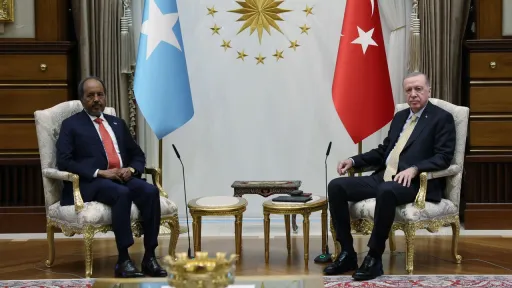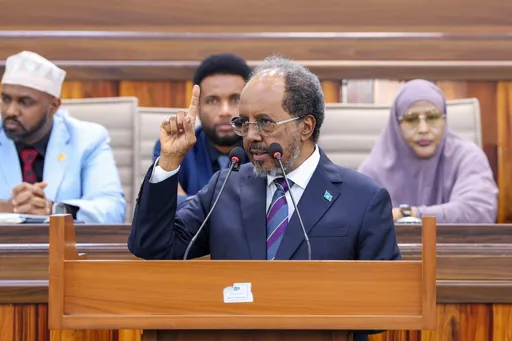Gambia’s initiative in 2019 and South Africa’s brave move in 2024 to refer Myanmar and Israel, respectively, to the United Nations’ International Court of Justice (ICJ) for human rights violations and possible genocide, has put the global spotlight on the African continent.
Gambia’s case did not initially make headlines, but the case did resurface after South Africa highlighted Israel's atrocities in Gaza.
South Africa was later joined by 52 countries, mostly from the global South who voiced their concerns about the injustice and deprivation of Palestinians under Israeli colonial settler rule.
As Israeli destruction of human life and infrastructure in Gaza continues, Africa as a continent long neglected by Western policymakers and the elite global media has boldly asserted itself.
Following the ICJ action, Brazilian president Luiz Inacio Lula da Silva recently told the African Union that the African continent is key to the cohesion and progress of the Global South. This is a good omen voiced by an observer outside of Africa.
Indeed, Africa has the benefit of a growing population while the rest of the world is contracting. But African countries must first get their house in order. Africa as a continent needs to overcome political instability, civil wars and accomplish a path of sustainable economic and environmental development in order to become the continent that will lead the Global South.
Economic strength
Often, optimism about Africa’s future is based on certain socio-economic factors and its "human potential."
Capital-driven global entrepreneurs salivate at predictions about Africa’s growing population, thinking only in terms of markets and profits. Meanwhile globally competitive economies like China and India, but also Europe and the United States, look to Africa as a source of cheap labour and raw materials.
Policymakers and observers pay attention to population size and market potential in the capitalist world. Currently, the cumulative population of the African continent is 1.4 billion people, roughly 18 percent of the world population and a projected four percent growth rate in 2024.
By 2050, the African continent is expected to grow to 2.4 billion people, and will account for more than a quarter of the total world population. Imagine this scenario in less than three decades, if pandemics, famine or catastrophic civil wars can be kept at bay.
By 2100, Africa is slated to have a staggering population of 4.2 billion people, trailing only the projected population of Asia’s 4.8 billion. Regions with dense populations enjoy numerous advantages, including cultural diversity, economic growth, increased demand for goods and services, and cost efficiency.
Much attention has also been paid to sub-Saharan Africa's gross domestic product (GDP) per capita, which has seen overall encouraging growth in the past five years. The numbers give economists and policymakers hope, but what does that mean in real terms?
Political conditions and instability
While the numbers may point towards an optimistic future for Africa, other indicators give reason for pause. In a decade-long trend, civil wars and inter-regional conflicts have displaced over 40 million people on the continent.
The Democratic Republic of the Congo (DRC) has seen an estimated 5.4 million deaths since 1998 due to conflict and other factors which have yet to be fully addressed.
Sudan, once the "breadbasket" of Africa and the largest country on the continent before its partition in 2011, has seen consistent instability and civil war. As of January 2024, it is estimated that 13,000 to 15,000 people have been killed around the capital city and in the region of Darfur.
Experts warn the country is at great risk. Already 5.9 million people are internally displaced and 1.4 million have fled as refugees. Additionally, some 25 million people are "in need of humanitarian assistance, with a looming food crisis and risk of famine," said Alex de Waal, Executive Director of the World Peace Foundation.
While the world is rightly outraged by Israel’s slaughter of Palestinians in Gaza, Sudan requires urgent attention. Several other conflicts in Western Sahara, South Sudan, Somalia, Mozambique, and Chad also need immediate attention from African statesmen.
In addition to war, foreign predatory interests in the continent’s mining riches are diverting huge amounts of much-needed resources away from the people of Africa and into private and foreign coffers. In the Great Lakes Region of Africa, destabilisation involves 10 countries largely over mineral resources.
Ongoing interstate conflict, the use of continental and foreign mercenary forces, and the trade in blood diamonds for arms involving serious violations of human rights are a set of hydra-like factors that also need redress.
The climate crisis is also a major threat in Africa. The issue sits in between many other challenges - development, poverty, water, flooding, and serious political conflicts - where interconnectivity only contributes to environmental degradation.
Africa’s growing population is fueling rapid urbanisation. With the rise of new cities, and with growing informal as well peri-urban spaces, serious environmental threats are predicted. Human wellbeing and flourishing will be at great risk if these factors are not deliberately and urgently addressed.
African renaissance
To build on Lula’s optimism, the highest priority is to reduce the threats of human-made tragedies on the continent, especially environmental ones.
This will require harnessing the collective energies of African people and reducing foreign dependency, resulting in sustainable human development and growth that meets the continent’s needs.
Aspirations for Africa’s rebirth have long been in the making. A renaissance is not a one-shot occurrence. It largely depends on the mobilisation of energies and resources with productive and transformative outcomes. Redressing shortcomings while simultaneously harnessing potential will gradually give rise to a much-needed transformative arc in African societies.
When talking of an African renaissance, two names readily come to mind: Cheikh Anta Diop, the Senegalese scholar and politician who died in 1986; and former South African president and statesman, Thabo Mbeki. During his presidency and his post-presidency efforts, Mbeki advocated for an African renaissance.
For both these leaders, the African renaissance is a call to action. Pan-Africanism, the need to strengthen African inter-state collaborations, the optimisation of resources and the free flow of knowledge, technological, human and artistic resources across the continent are critical elements in the realisation of such a renaissance.
Reducing external dependency will largely allow African nations to prioritise their own needs. States should be able to prioritise their domestic needs above the needs of global imperial powers, and in doing so, be in a position to withstand the dictates of global financial behemoths.
Building Pan-African institutions ought to be a high priority. Mbeki has criticised governance in Sub-Saharan Africa. He pointedly identified the proliferation of kleptocratic and predatory behaviours among Africa’s ruling elites who have favoured personal gain at all costs as a major problem deserving redress.
He has also prioritised the ethical: character formation so that only persons of integrity can be effective agents of change in the service of the people, in his view. Mbeki’s entire renaissance discourse is against elites, tyrants and dictators who are corrupting society.
Accountable governance will enable sustainable economic regeneration. Coupled with political stability and accountability Mbeki’s renaissance recipe will allow the people of the African continent to contribute to human civilisation and be beneficiaries of those achievements as Diop anticipated it.
Capitalism is running roughshod all over the continent with little imagination for alternatives. There is an awareness to keep the virgin habitat of a largely unspoiled continent intact for future generations while simultaneously providing much-needed human development opportunities for its people within a sustainable environmental future.
An African renaissance must make a difference first to its inhabitants and then to the world. The richness of the continent’s diverse peoples, languages, cultures, traditions, and faith practices are its assets.
The Nigerian novelist Chinua Achebe pointed to this in his own lyrical manner when raising the need to retain and cherish "the old dignity" and not lose everything to the modern and instantly gratifying practices.
Achebe in Hopes and Impediments: Selected Essays shares the work of the Guinean writer, Camara Laye. Laye wrote of the slower pace of village life compared to the bustle of the city.
If the African future can preserve its historical narratives of dignity, its depths of reflection and the complex thought embedded in its diverse cultures, then the continent has already invested in a unique human capital that few rivals can surpass.
Observing the villagers Laye said, "In everything, I noticed a dignity which was often lacking in town life…they always spoke only after due reflection, and because speech itself was a most serious matter."
If the African future can preserve its historical narratives of dignity, its depths of reflection and the complex thought embedded in its diverse cultures, then the continent has already invested in a unique human capital that few rivals can surpass.
In the past decade, at least two African nations have prioritised human dignity—a vital ethical teaching in African religious traditions and mythologies—to mobilise the world to pursue the onerous responsibility to preserve dignity and justice in Gaza and elsewhere.
More than ever, the bosom of the African continent needs these gifts most to further its own sustainable future.
The author, Ebrahim Moosa, is the Mirza Professor of Islamic Thought and Muslim Societies in the Keogh School of Global Affairs, at the University of Notre Dame in Indiana, the United States.
Disclaimer: The views expressed by the author do not necessarily reflect the opinions, viewpoints and editorial policies of TRT Afrika.
➤Click here to follow our WhatsApp channel for more stories.
























